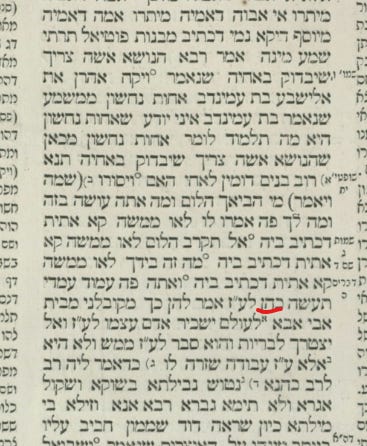Rabbi Yonatan on Yonatan
Hachi Garsinan was recently down, so I wasn’t able to put this together. It is now up.
When giving the daf on Sunday, Bava Batra 110, I noticed that Rabbi Yochanan weighed in on Yehonatan (a priest for idolatry) repenting.
כֵּיוָן שֶׁרָאָה דָּוִד שֶׁמָּמוֹן חָבִיב עָלָיו בְּיוֹתֵר, מִינָּהוּ עַל הָאוֹצָרוֹת, שֶׁנֶּאֱמַר: ״וּשְׁבֻאֵל בֶּן גֵּרְשׁוֹם בֶּן מְנַשֶּׁה נָגִיד עַל הָאֹצָרוֹת״. וְכִי שְׁבוּאֵל שְׁמוֹ? וַהֲלֹא יְהוֹנָתָן שְׁמוֹ! אָמַר רַבִּי יוֹחָנָן: שֶׁשָּׁב לָאֵל בְּכׇל לִבּוֹ.
The Gemara continues its discussion of that episode. Later, when King David saw that money was excessively precious to Jonathan, he appointed him as director of the treasuries of the Temple, as it is stated: “And Shebuel, the son of Gershom, the son of Moses, was ruler over the treasuries” (I Chronicles 26:24). The Gemara asks: And was his name really Shebuel; but wasn’t his name Jonathan? Rabbi Yoḥanan says: He is called Shebuel in order to allude to the fact that he repented and returned to God [shav la’el ] with all his heart.
I wondered whether it could be actually Rabbi Yonatan saying this, and indeed, there’s one manuscript on Hachi Garsinan, Paris 1337, has this:
That would make it an eponymous attribution. Rabbi Yonatan and Rabbi Yochanan are often substituted for each other. However, as I’ve discussed in the past, we can often explain eponymous attributions as
someone being interested in a subject because of his name
random chance, with enough names and enough statements
a scribal error, where the scribe miscopies a proximate word into the name
This instance could add to the body of evidence of scribal errors — most manuscripts there have Yochanan, and Yonatan is dittography.
Yehonatan was a komer for idolatry. The Vilna Shas, which would heavily censored, has that he was a kohen for idolatry. Rav Steinstaltz notes that this is censored.
All manuscripts, and even earlier printings, have כומר. For instance, Hamburg 165:
But in more modern Hebrew, כומר is regularly used to denote a Christian priest, so you can understand how the censor was sensitive to such usage.




